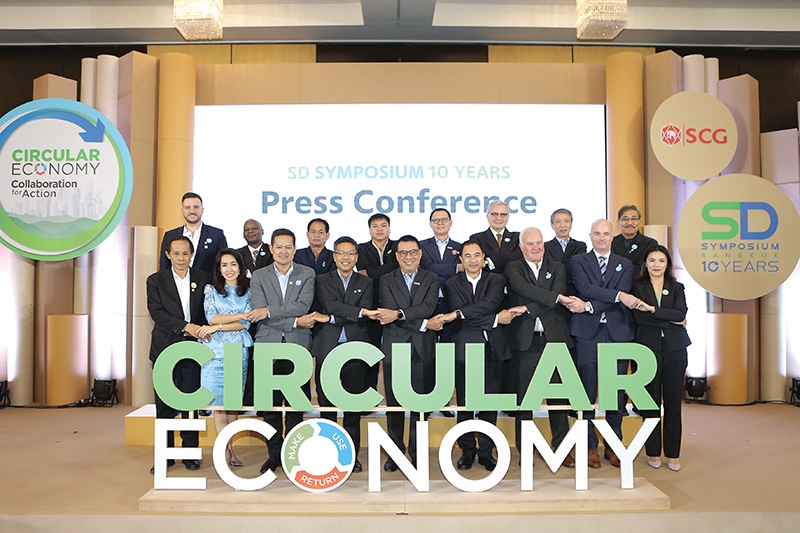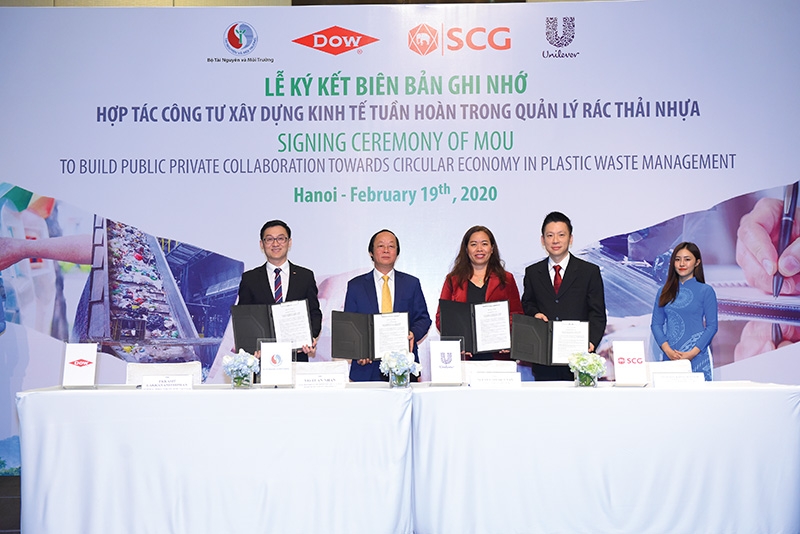The country’s smart approach to sustainable development
 |
| The Sustainable Development Symposium, with SCG as chair, led engagement of regional players |
Most recently, pioneering businesses like SCG, Dow Vietnam, and Unilever Vietnam have joined efforts with Vietnam’s Ministry of Natural Resources and Environment (MoNRE) to launch the first public-private collaboration (PPC) model in building a circular economy in plastic waste management, heralding a fresh direction for the local business community.
Economic development, in parallel with preserving natural resources and minimising harm to the environment, is, by essence, the core of circular economy. Under the “production-usage-recycling” format, the circular economy has consumed natural resources in a responsible way, simultaneously bolstering production efficiency.
Via realising sweeping changes to production and value chains and consumption patterns, redesigning industrial systems, and ensuring effective waste management, the process has created many added values while enhancing sustainability of businesses towards the environment and society alike.
 |
| A ceremony for collaboration towards a circular economy in plastic waste management was held last month |
In recent years, the linear economy employing the “take-make-dispose” model has left countless repercussions on the living environment. Vietnamese garbage is forecast to be doubled in the next 15 years. Meanwhile, the country’s waste recycling just fetches below one-tenth of total rubbish volume.
A bulk volume of plastic waste is either directly buried at dumping sites or being discharged into the ocean. In this context, propelling the model of the circular economy proves the smart move Vietnam needs to adopt towards achieving sustainable development goals.
The greatest challenge to Vietnam currently is that most of businesses, particularly small- and medium-sized enterprises (SMEs), have finite capacity when it comes to recycling technology. In addition, it is the inherent habit in production and consumption patterns of the whole society in using single-use nylon bags and other plastic items.
Collaboration between businesses, particularly leading players, in tackling plastic waste has since become an imperative demand to push up the circular economy model in Vietnam.
The country came up with first-of-its kind PPC model towards building a circular economy in plastic waste management in February, with engagement of industry players such as SCG, Dow Vietnam, Unilever Vietnam, and the MoNRE.
The model aims to promote knowledge sharing, technology transfer, public awareness enhancement, and reforms and innovation to radically settle the plastic waste dilemma, particularly how to deal with single-use plastic packaging on a nationwide scale.
The engagement of SCG in particular – a leading industrial conglomerate in the ASEAN – is an eminent instance for the application of the circular economy in production and business activities, as well as efforts in networking with relevant stakeholders for cycle perfection across the whole value chain.
One of SCG’s biggest efforts in this regards was the biennial Sustainable Development Symposium held in 2018 in Thailand under theme “Circular Economy: The Future We Create”.
The event inspired and connected 1,000-plus representatives from government and non-government organisations, and businesses, bringing the ASEAN into the journey the circular economy model has made towards achieving sustainable development goals in the region.
At the symposium, regional leading players shared their valued experiences on promoting circular economy development, as well as pushing up collaboration of public-private sectors to expedite circular economy on an extensive scale. In the role as chair, SCG brought to exposure many typical examples from its operation practices, heralding new fresh directions for the parties engaged.
In Vietnam, SCG plans to make the $5.2 billion Long Son Petrochemical project – the biggest complex of its kind in the country – in the southern province of Ba Ria-Vung Tau its pilot for circular economy applications in Vietnam.
Along with this the complex, which kicked-off construction in 2017, will perfectly meet circular economy requirements with gas emissions and discharged water meeting set standards and its solid waste being taken back for reuse, creating fresh value.
A leading player in sustainable development in Southeast Asia, harmonising business growth and social and environmental benefits is the top priority in SCG’s development strategy.
Promoting the circular economy model is the next step this 108-year old business group is set to take on, in order to achieve future prosperity of businesses and the community in the region. According to SCG, this approach should be what local firms need to apply for the foreseeable future.
What the stars mean:
★ Poor ★ ★ Promising ★★★ Good ★★★★ Very good ★★★★★ Exceptional
Related Contents
Latest News
More News
- VNPAY and NAPAS deepen cooperation on digital payments (February 11, 2026 | 18:21)
- Vietnam financial markets on the rise amid tailwinds (February 11, 2026 | 11:41)
- New tax incentives to benefit startups and SMEs (February 09, 2026 | 17:27)
- VIFC launches aviation finance hub to tap regional market growth (February 06, 2026 | 13:27)
- Vietnam records solid FDI performance in January (February 05, 2026 | 17:11)
- Manufacturing growth remains solid in early 2026 (February 02, 2026 | 15:28)
- EU and Vietnam elevate relations to a comprehensive strategic partnership (January 29, 2026 | 15:22)
- Vietnam to lead trade growth in ASEAN (January 29, 2026 | 15:08)
- Japanese business outlook in Vietnam turns more optimistic (January 28, 2026 | 09:54)
- Foreign leaders extend congratulations to Party General Secretary To Lam (January 25, 2026 | 10:01)

 Tag:
Tag:




















 Mobile Version
Mobile Version